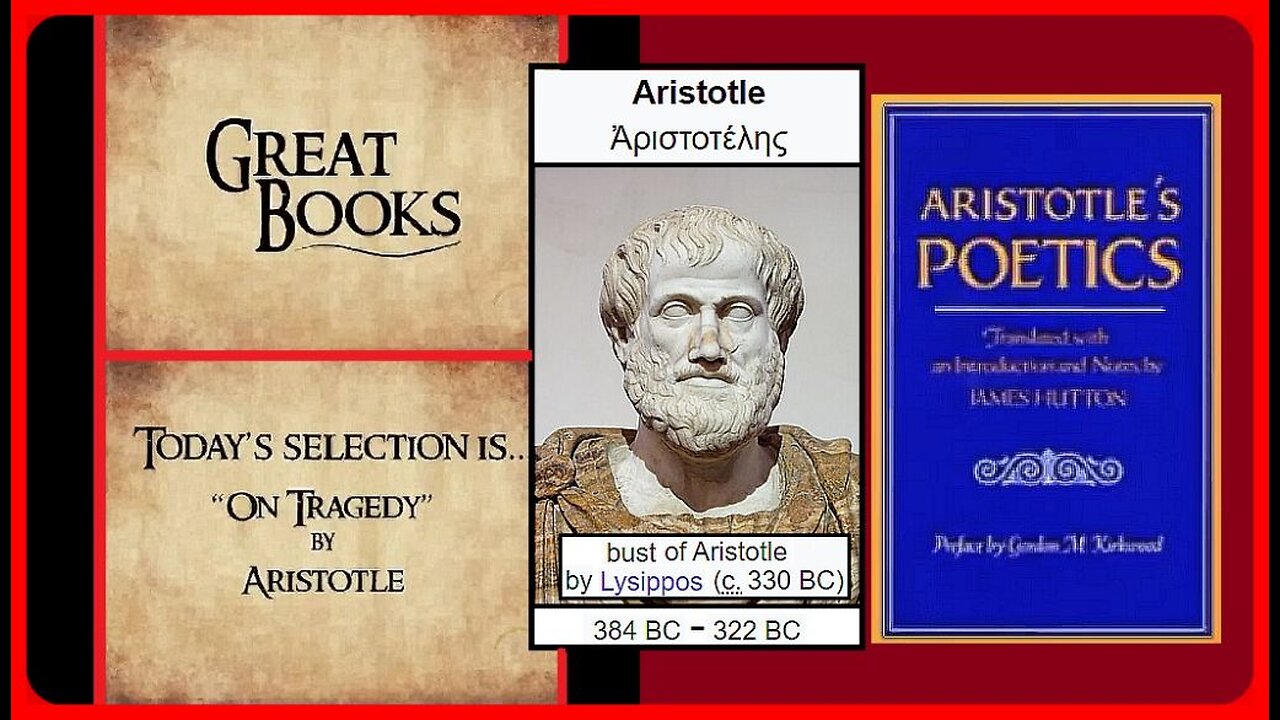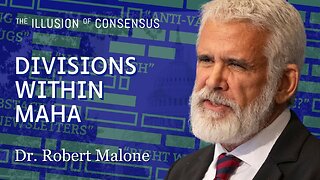Premium Only Content

📚 Great Books: 'On Tragedy by Aristotle' • Poetics • ( 384 - 322 B.C.) •🕞28m
Publication date 18 February 2015 • ( NCTV17 - Public Access TV, Naperville ) • Great Books: On Tragedy by Aristotle - In many ways, Aristotle's Poetics read like a set of lecture notes on the drama of his time. He is careful to define exactly what he means and supports his generalizations by referring to earlier and contemporary authors and artists. His analysis and description of poetry and tragedy in several ways are directed against the teachings of Plato, who dismissed poets from his Republic as encouraging faulty emotions in the audience. The discussion of tragedy in Aristotle's Poetics had a profound influence on critical attitudes to drama in the Renaissance. Classically educated writers like Sir Philip Sidney, or Shakespeare's contemporary dramatist, Ben Jonson, took Aristotle's descriptions of the drama of his time as prescriptions for tragedy as a whole. Most notably, they accepted what was thought of as the three "unities": time (the plot should deal with events occurring within a single day), place (the scene should take place in one location), and action (there should only be a single plot, with no unnecessary digressions). Shakespeare was probably aware of the concept of the unities; his early play The Comedy of Errors adheres to them, as does one of his final works, The Tempest; his other plays conform more closely to the conventions evolved in the early English stage, where plots were more flexible.
( 👉 https://internetshakespeare.uvic.ca/doc/Poetics_M/complete/index.html )
About Aristotle:
Aristotle (Greek: Ἀριστοτέλης Aristotélēs; (384–322 BC) was an Ancient Greek philosopher and polymath. His writings cover a broad range of subjects spanning the natural sciences, philosophy, linguistics, economics, politics, psychology, and the arts. As the founder of the Peripatetic school of philosophy in the Lyceum in Athens, he began the wider Aristotelian tradition that followed, which set the groundwork for the development of modern science.
Little is known about Aristotle's life. He was born in the city of Stagira in northern Greece during the Classical period. His father, Nicomachus, died when Aristotle was a child, and he was brought up by a guardian. At 17 or 18, he joined Plato's Academy in Athens and remained there until the age of 37 (c. 347 BC). Shortly after Plato died, Aristotle left Athens and, at the request of Philip II of Macedon, tutored his son Alexander the Great beginning in 343 BC. He established a library in the Lyceum, which helped him to produce many of his hundreds of books on papyrus scrolls.
Though Aristotle wrote many treatises and dialogues for publication, only around a third of his original output has survived, none of it intended for publication. Aristotle provided a complex synthesis of the various philosophies existing before him. His teachings and methods of inquiry have had a significant impact across the world, and remain a subject of contemporary philosophical discussion.
Aristotle's views profoundly shaped medieval scholarship. The influence of his physical science extended from late antiquity and the Early Middle Ages into the Renaissance and was not replaced systematically until the Enlightenment and theories such as classical mechanics were developed. He influenced Judeo-Islamic philosophies during the Middle Ages, as well as Christian theology, especially the Neoplatonism of the Early Church and the scholastic tradition of the Catholic Church.
Aristotle was revered among medieval Muslim scholars as "The First Teacher", and among medieval Christians like Thomas Aquinas as simply "The Philosopher", while the poet Dante called him "the master of those who knows". His works contain the earliest known formal study of logic and were studied by medieval scholars such as Peter Abelard and Jean Buridan. Aristotle's influence on logic continued well into the 19th century. In addition, his ethics, although always influential, gained renewed interest with the modern advent of virtue ethics.
( 👉 https://en.wikipedia.org/wiki/Aristotle )
Source: 👉 https://archive.org/details/Great_Books_-_On_Tragedy_by_Aristotle
——• ➤✝️ "Page Chronicles" Channel & Operator DISCLAIMERS
📌 I do not own the ©️ Copyright / Licensing to this content - but it's posted Under FAIR USE. (Education)
-
 11:58
11:58
Page Chronicles
1 day agoA Day of Solemn Remembrance • Harley Schlanger (Schiller Institute) •🕞12 mins
1301 -
 2:02:16
2:02:16
The Illusion of Consensus
19 days agoDr. Robert Malone On The Current State Of MAHA
8131 -
 47:39
47:39
Donald Trump Jr.
6 hours agoRussia Hoaxers Must Face Justice, Interview with The Federalist's Sean Davis | TRIGGERED Ep.265
65.7K39 -
 1:05:55
1:05:55
BonginoReport
3 hours agoBiden is a BIG BULLY! - Nightly Scroll w/ Hayley Caronia (Ep.107) - 08/07/2025
33.5K17 -
 1:16:24
1:16:24
Kim Iversen
5 hours agoAIPAC NATION: Israel First, Who Really Runs Washington?
71.6K141 -
 LIVE
LIVE
Nerdrotic
2 hours ago $0.70 earnedInvestigations Into Earth's Moon | Forbidden Frontier #110
448 watching -
 LIVE
LIVE
Quite Frankly
8 hours ago"The Unconscious Mind & Hypnosis" ft. Giulio Anselmo 8/7/25
488 watching -
 1:06:01
1:06:01
vivafrei
3 hours agoTrumps Crackdown on the Census! Corruption in Canada, Eh! Tulsi's Interview! Carville's Apology!
32.2K20 -
 15:32
15:32
AndresRestart
8 hours ago $0.11 earnedTHESE Mario 40th Anniversary Rumors Make Way More Sense Than That Collection "Leak"
6.39K1 -
 2:11:45
2:11:45
Redacted News
4 hours agoThis is HUGE news, and neo-cons are already trying to DESTROY it | Redacted News Live
113K83